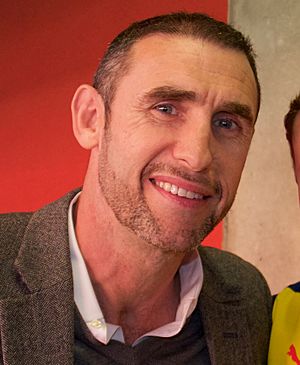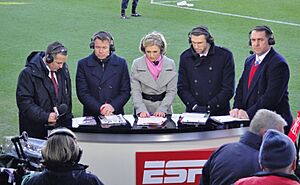Martin Keown facts for kids

Keown in 2015
|
|||
| Personal information | |||
|---|---|---|---|
| Full name | Martin Raymond Keown | ||
| Date of birth | 24 July 1966 | ||
| Place of birth | Oxford, England | ||
| Height | 6 ft 1 in (185 cm) | ||
| Position(s) | Centre Back | ||
| Youth career | |||
| 1980–1984 | Arsenal | ||
| Senior career* | |||
| Years | Team | Apps | (Gls) |
| 1984–1986 | Arsenal | 22 | (0) |
| 1985 | → Brighton & Hove Albion (loan) | 23 | (1) |
| 1986–1989 | Aston Villa | 112 | (3) |
| 1989–1993 | Everton | 96 | (0) |
| 1993–2004 | Arsenal | 310 | (4) |
| 2004–2005 | Leicester City | 17 | (0) |
| 2005 | Reading | 5 | (0) |
| 2012 | Wembley | 0 | (0) |
| Total | 585 | (8) | |
| International career | |||
| 1983 | England U17 | 3 | (0) |
| 1983 | England Youth | 1 | (0) |
| 1987–1988 | England U21 | 8 | (0) |
| 1991 | England B | 1 | (0) |
| 1992–2002 | England | 43 | (2) |
| *Club domestic league appearances and goals | |||
Martin Raymond Keown (born on 24 July 1966) is a well-known English football expert and former professional player. He was a strong defender who played from 1984 to 2005. He is most famous for playing in the Premier League for Arsenal. He played over 400 games for Arsenal and won ten major trophies with them.
Keown also played for other clubs like Brighton & Hove Albion, Aston Villa, Everton, Leicester City, and Reading. He first played for the England national team in 1992 against France. Over the next ten years, he played 43 times for England. He often played alongside his Arsenal teammate Tony Adams in defense for both club and country. Keown represented England in four big international tournaments: the 1998 and 2002 World Cups, and Euro 1992 and Euro 2000.
Today, Martin Keown works part-time as a scout and coach for Arsenal. He is also a football expert for the BBC and BT Sport. In 2012, he briefly came out of retirement to play for Wembley in their FA Cup matches.
Contents
Club Career Highlights
Starting at Arsenal
Martin Keown grew up in Oxford and played for local teams, including a Gaelic football team. He joined Arsenal as a schoolboy in 1980. His first professional game was on loan at Brighton & Hove Albion in 1984. He made his debut for Arsenal on 23 November 1985. He played 22 league games that season. However, when George Graham became manager in 1986, Keown left Arsenal. He joined Aston Villa for £125,000.
Time at Aston Villa
Keown joined Aston Villa in 1986. The team had just avoided being relegated (moving down a league). He played 36 league games that season, but Villa finished last and were relegated to the Second Division.
The next season, Graham Taylor became manager. Keown was a key player in helping Villa get promoted back to the top league right away. He played almost every game and scored three goals. He helped the team stay in the top league the following season. In 1989, he moved to Everton for £750,000.
Playing for Everton
Keown started well at Everton. The team was at the top of the league for a short time in late 1989. They finished sixth that season. Keown played 20 league games. He continued to play regularly for Everton. In February 1993, he returned to Arsenal for £2 million.
Return to Arsenal and Success
When Keown returned to Arsenal, he could not play in the FA Cup or League Cup finals that year because he had already played for Everton in those competitions. However, he played 16 Premier League games. He was a very flexible player, able to play in different defensive positions. He often played alongside top defenders like Steve Bould and captain Tony Adams.
Keown missed Arsenal's Cup Winners' Cup win in 1994 due to injury, but he had played in earlier rounds. He did play in the final the next year when Arsenal lost to Real Zaragoza.
He played almost every game for Arsenal for the next four seasons. In 1996–97, Arsène Wenger became the new manager. Keown played 28 games as a defensive midfielder. He broke his shoulder playing for England, which kept him out for five months. Because of this, he played only 18 league games in the 1997–98 season. That season, Arsenal won both the Premier League and the FA Cup, which is called a "Double." These were the first major trophies of Keown's career.
In the years that followed, Keown became a very important part of Arsène Wenger's team. In a 2000–01 UEFA Champions League game, Keown famously scored two goals in the last five minutes. This helped Arsenal come back from being 2–1 down to win 3–2. He won a second "Double" with Arsenal in 2002. He continued to be a regular player until the end of the 2002–03 season. That year, Arsenal won their ninth FA Cup.
On 21 September 2003, during a match between Arsenal and Manchester United, Manchester United were given a penalty kick late in the game. The score was 0–0. When the penalty kick missed, Keown and Ray Parlour reacted strongly. After the game, Keown was involved in a heated discussion. He was later fined £20,000 and suspended for three games for his part in the incident, which became known as the "Battle of Old Trafford". Arsenal went on to finish the 2003–04 season as "unbeaten champions". Keown played ten league games that season. He left Arsenal on a free transfer in the summer of 2004, after 11 years in his second time at the club.
Later Career and Retirement
After leaving Arsenal, Keown signed with Leicester City. He stayed there for less than six months. In January 2005, he joined Reading until the end of the season, when he retired from professional football.
In 2012, Keown briefly returned to play for Wembley, a non-league team. This was part of a special event where several former professional players joined the team for their 2012–13 FA Cup matches. Wembley was knocked out of the competition by Uxbridge.
International Career with England
Martin Keown played for England's Under-16 and Under-18 teams. He was also eligible to play for the Republic of Ireland and Northern Ireland because of his parents' backgrounds. However, he chose to play for England, the country where he was born.
He made his debut for the senior England team in 1992 against France. He was called up for UEFA Euro 1992 due to an injury to another player. He played in all three of England's matches in that tournament.
After a period where he was not selected, Keown was called back to the England squad in 1997. He went to the 1998 World Cup but did not play in any games. He became a regular player under manager Kevin Keegan. He even captained the team once against Finland. He played in two of England's games at Euro 2000.
By the time Sven-Göran Eriksson became manager, Keown was getting older. He still went to the 2002 World Cup, but again, he did not play in any matches. Keown announced his retirement from international football the day after England was knocked out of the World Cup by Brazil. In total, he played 43 times for England and scored two goals.
Life After Playing Football
After retiring from playing, Martin Keown joined the coaching staff at Newbury in 2005. He later returned to his former club, Arsenal, to coach and earn his coaching qualifications. Former Arsenal manager Terry Neill praised Keown for his role in helping Arsenal's young defense during the 2005–06 season. In 2007–08, Keown also coached the Oxford University Blues Football team part-time.
Today, Keown often appears as a football expert on the BBC's football shows, including Match of the Day. He also covers the Champions League for the Irish TV channel TV3. He worked for ESPN UK during the 2011 Emirates Cup.
Honours and Achievements
Martin Keown won many trophies during his career, especially with Arsenal.
Arsenal
- Premier League: 1997–98, 2001–02, 2003–04 (This last win was with the famous "Invincibles" team!)
- FA Cup: 1997–98, 2001–02, 2002–03
- FA Community Shield: 1998, 1999, 2002
- European Cup Winners' Cup: 1993–94
Individual Awards
- Arsenal Player of the Season: 1995−96
Personal Life
Martin Keown lives in Oxford with his wife, Nicola. His son, Niall, is also a professional footballer.
See also
 In Spanish: Martin Keown para niños
In Spanish: Martin Keown para niños
 | Shirley Ann Jackson |
 | Garett Morgan |
 | J. Ernest Wilkins Jr. |
 | Elijah McCoy |


